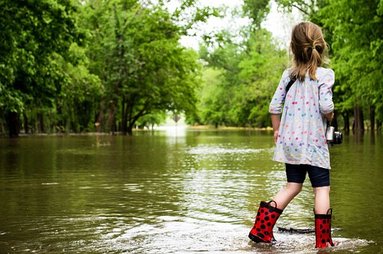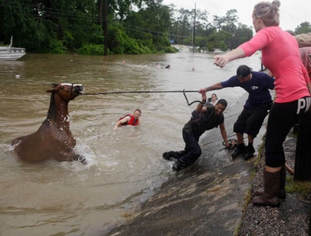

Dealing with Loss
People are still missing. People have died. In the coming weeks, loss will be felt. Not just the loss of homes and possessions, but the loss of a sense of safety, security and a former sense of normalcy. Entire communities have been destroyed. It is estimated that as many as 40,000 homes have been wiped out and thousands more damaged. Hurricane Harvey in Texas and Louisiana has affected 13 million people. Schools, grocery stores, churches, businesses and all normal functions of life are gone. In moments of danger survival is all that matters. There is no time to think or feel except how to get to safety. The physical and emotional impact is momentarily put on hold. In the days that follow, thousands of people will feel the shock and despair of enormous loss and wonder how they can create their life again.
This is trauma. The stories of the traumatized and the terror that individuals experienced will be alarming. People are dealing with nightmarish and unexpected danger that sounds otherworldly. One man was torn up by a colony of fire ants floating on the water. Another man watched hordes of them crawl up any solid surface they could find. A woman and her children trapped for five days were finally rescued and brought to a shelter. Wide-eyed and in shock, she and her children were cold, water logged and hadn’t eaten in days. Emotionally, in a state of panic, fear and anger, she was spent. Finally finding shelter, her emotions emerged in a roar. Her “Mama Bear” came out strong and fierce; there was no ignoring her demands to get her children food and warmth.
Emotions will be heightened as the reality of the situation begins to arise and the tension and emotions that have been held inside surface. It will take time for the full impact to be known. After getting people out of harms way, the first response in a disaster of this proportion is to provide food, shelter and the basic necessities to those in need. We know how to provide for the physical needs. Humans come together in disasters and unify against a common foe. Human chains formed in Houston to rescue people and animals. Immediately there has been a compassionate outpouring of volunteers, donations of money, food and clothing, and people providing space in their homes and sheltering animals.
Softening the Blow of the Emotional Aftermath
Providing for the emotional needs in the aftermath is more challenging. Once people have those basic needs met and the immediate crisis is over, those affected are often left to fend for themselves. The aftermath of a catastrophe is the most daunting. Helping people deal with their acute feelings of vulnerability is essential. Connection with others is key, which helps a person know they are not alone and that someone cares.
It has been found that post traumatic stress syndrome, PTSD, can be minimized or even eliminated when a person is able to freely talk about their experience with someone supporting and accepting their emotions and their story. This includes validating the traumatized persons experience, comforting them, and assuring them that they are safe and that there is an available system of support to help keep them safe. Knowing that you are safe reduces the flush of fear activation in your body.
Allowance and Acceptance Restores Equilibrium
After experiencing trauma, it is normal for emotions to arise apparently without any provocation. A life-threatening event throws you out of balance. There is a sense of being “out of control” and an awareness of being at the mercy of random over-powering forces. Much of the feeling of safety occurs when you are able to know you are capable of controlling some aspect of yourself. By allowing yourself to gently experience the intense emotions that cycle through and learning how to cope with them rather than shutting them down is healing.
Often people feel they are helping someone by telling them to “quiet down, stop crying, quit being so angry and emotional, be calm,” which might temporarily shut down the emotional reaction, but is actually a disservice. Emotions are a vibrational charge of energy coursing through the body. That energy has to go somewhere and will sit inside unless there is release and resolution. It Is better to help by encouraging the person to feel safe with their emotions and let them know it is normal to be having intense emotions after a life-threatening shock. This validates their personal experience and lets them know that they are okay and will regain their equilibrium.
Release happens when you consciously touch and feel the sensations of the emotion allowing the energy to flow and dissipate. It can be scary to feel the intensity because there is the perception that the emotions are uncontrollable. Being patient, compassionate, and taking as much time as needed to slowly feel the emotions and stopping when it gets too much helps you to know you are capable of managing the flow.
Disturbing and reoccurring thoughts are also common after a traumatic experience. It is a natural part of the healing process for these thoughts to come up and will diminish over time when given the proper support. Resolution occurs when you realize the event is past and can accept the reality that it happened, you have skills and resources that showed up, you survived, and you are stronger and grew through the experience. Instead of seeing yourself as powerless, you see how the experience fostered a greater realization of your ability to thrive and to meet life. This gives you the confidence to create your life and move forward.
Challenge, Growth and Opportunity
Whether you are one that is experiencing trauma, has in the past, or is someone reaching out to help someone in distress, in truth, we are all in this together. As you feel compassion and empathy for your own vulnerability your heart can expand to touch this very human quality and see that growth and resilience are found within the core of your most tender parts.
For all of the loss that is part of this tragedy, there is the opportunity for much growth and wisdom to occur. Humans are resilient and though we often focus on the darker aspects of our nature, adversity also brings forth the unifying higher qualities. Pay attention to all of the stories of miraculous rescues, and story after story of courageous shining examples of selfless bravery and giving. See all who are uplifting and supporting their brethren. Let us praise those characteristics and bring a greater awareness in our daily lives to love our fellow beings and offer our support and encouragement.
Let the music keep our spirits high
Let the buildings keep our children dry
Let creation reveal its secrets by and by, by and by
When the light that's lost within us reaches the sky
~ Jackson Browne “Before the Deluge”


 RSS Feed
RSS Feed